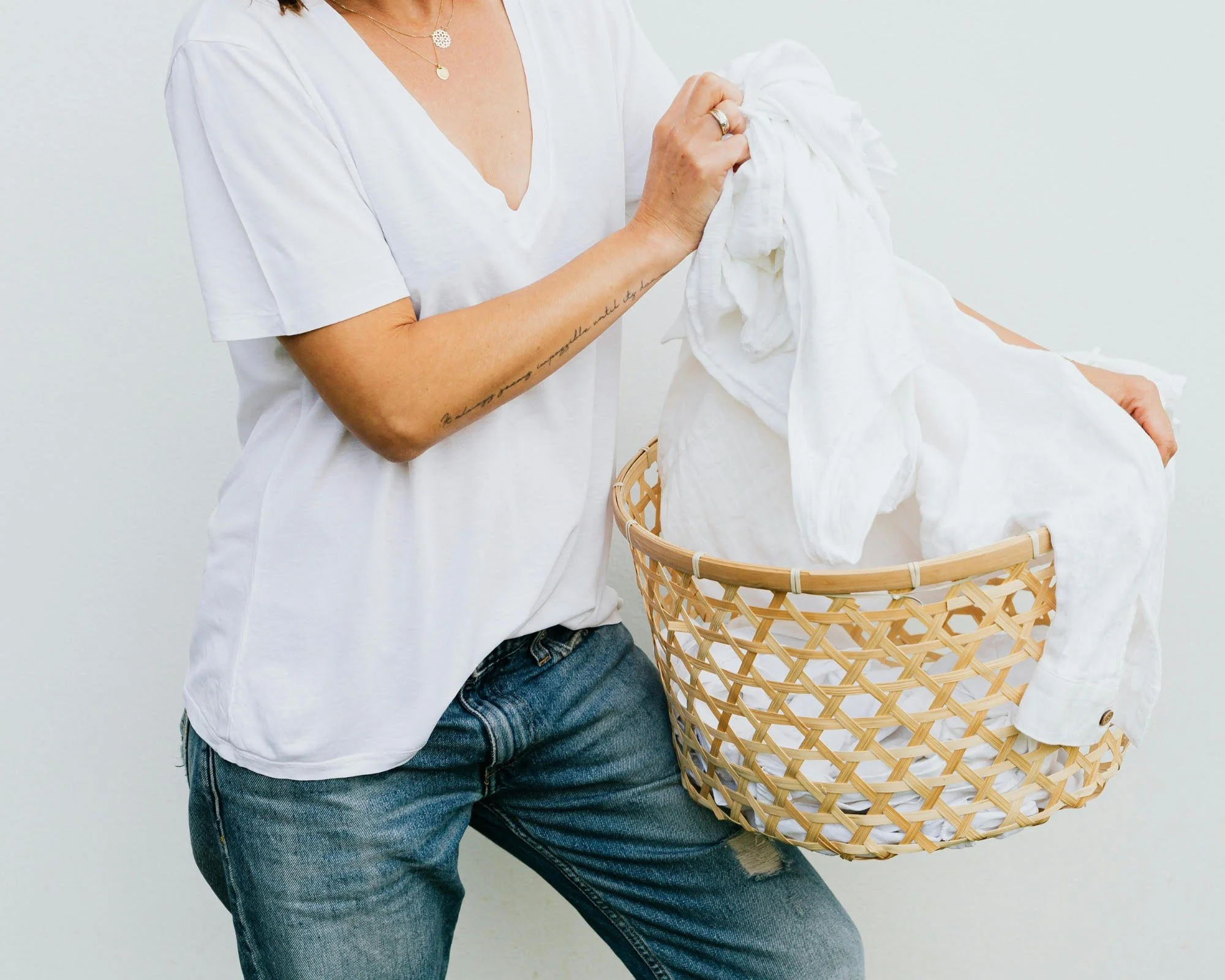Controlled Chaos: A Mom Airs Her Dirty Laundry
If you’ve ever looked around your living room and wondered whether a small tornado or your children caused the mess — welcome, friend, you’re in good company. I’m a working mom who can juggle deadlines, school lunches, and the occasional existential crisis, but apparently not the laundry. My house perpetually hovers somewhere between “lived in” and “featured on a before photo.” There are days I feel like I’m the CEO of a very chaotic startup called “Family, Inc.” — except the employees never listen, the coffee’s always cold, and the HR department (also me) is one complaint away from quitting. I love my family fiercely, but let’s just say if organization is an executive function, mine has been on an extended coffee break.
You’ve probably heard the phrase executive function and thought, “That sounds fancy — do I need a business degree for that?”
Nope. Executive functions are simply the brain’s behind-the-scenes managers. They help us plan, focus, remember things, and keep all the plates spinning without losing our minds.
And guess what? One of the biggest executive functions is organization — that magical skill that keeps life (mostly) on track.
So, what Is Organization Anyway?
In real life, organization means you know where stuff is — and not just because it’s buried under yesterday’s mail.
It’s the ability to:
Keep track of your belongings (like remembering where your car keys actually are).
Create systems so things have homes (no, “the floor” doesn’t count).
Find what you need when you need it — without turning into a human tornado.
When you’ve got your organization game going, life just flows better. Less panic, fewer meltdowns, and more time for coffee that’s still hot.
The Moms Who Have It Together (and Make It Look Easy)
We all know that mom — the one who seems to glide through the day like she’s got a personal assistant whispering in her ear.
She:
Never loses track of permission slips or car keys.
Has systems that make finding things a breeze (her shoes aren’t just somewhere; they’re on a labeled shelf).
Gives everything in her house an official address.
Actually finds what she’s looking for — on purpose.
She’s not a magician. She’s just mastered organization as an executive function.
And Then There’s… the Rest of Us
For the rest of us mere mortals, organization feels more like a full-contact sport.
We’re the moms doing frantic treasure hunts at 7 a.m. for the missing shoe or the field trip form that vanished into the void.
Our homes might have systems, but they usually involve “putting stuff on that one chair until it topples.”
Sound familiar? Then you’ve probably run into a few of these struggles:
Constantly losing things and replacing them (why do we own six pairs of scissors and still can’t find one?).
Not having real systems — just hopeful piles.
Leaving things out for someone else to “deal with” (translation: trip over).
Feeling like your house is a stress factory instead of a cozy sanctuary.
But here’s the thing — being organized isn’t about being perfect. It’s about functioning with less chaos. And good news: it’s a skill you can build, not a personality trait you’re missing.
The 3-Step Path to a More Organized (and Less Frazzled) Life
Step 1: Simplify — Declutter and Downsize
Here’s the truth: you can’t organize clutter. It’s like trying to alphabetize a junk drawer full of mystery cords and broken crayons.
The first step is to get rid of the stuff you don’t need.
Start small — one drawer, one shelf, one corner that’s been giving you side-eye for months.
Ask yourself:
Do I actually use this?
Does it make me happy or just take up space?
If I forgot it existed, maybe I don’t need it.
And when in doubt — toss, donate, or hand it to a friend with more patience.
Step 2: Systemize — Give Everything a Home
Now that you’ve cleared the clutter, it’s time to make your space make sense.
Set up systems that actually fit your family’s lifestyle — labeled bins, hooks by the door, baskets for mail (not on the counter, for once).
Your future self will thank you when you can find your kid’s soccer socks in under five minutes.
Step 3: Sustain — Keep It Going with Simple Habits
Organization isn’t a “once and done” situation — it’s more like a lifestyle, but without the fancy hashtag.
Build small daily habits:
Do a five-minute tidy before bed.
Put things back where they belong (yes, right now).
Reset high-traffic areas every day so chaos doesn’t pile up.
Little habits add up. Before you know it, you’ll be that mom who “has it all together” — or at least looks like she does.
The Perks of Seeing an Intern
I’ve always been drawn to stories that flip the script—where what first appears to be a weakness turns out to be a hidden strength. One of my favorite examples comes from the 2012 coming-of-age film The Perks of Being a Wallflower. The main character, Charlie, is a “wallflower”—someone who tends to observe life from the sidelines rather than dive in headfirst. The film doesn’t shy away from the challenges of this trait—feelings of isolation, passivity, and difficulty expressing emotions—but it also reveals its quiet advantages: empathy, creativity, and deep reflection.
In a similar way, clinical interns have unique strengths and opportunities that can make working with an intern an especially great choice, such as:
Focused Attention. Interns often work with smaller caseloads—usually 5–10 clients—allowing them to devote more time, energy, and reflection to each person. They also consult regularly with experienced supervisors, meaning your care benefits from multiple perspectives. I still remember how deeply invested I felt in my early clients, determined to give them my very best. Would you rather be one of ten people your counselor sees each week, or one of forty?
Fresh Perspective. Many interns bring years of prior life or career experience to the counseling room. These diverse backgrounds—whether in teaching, business, healthcare, the arts, or other fields—add richness and relatability. My own therapist once owned a local newspaper, and his insight helped me navigate career anxiety with wisdom and clarity. During my own internship, I found myself drawing lessons from a seemingly unrelated job at an ice cream shop—lessons about caring for people well, paying attention to the details, and making each interaction matter.
Affordability. Intern sessions often cost around $50—significantly less than the $120–$225 that many licensed therapists charge. That difference can make therapy more accessible and sustainable over time. And if your intern happens to be particularly skilled and compassionate (which we believe that ours are!), you’ve received high-quality care at a fraction of the cost. Think of it as discovering an up-and-coming star before the rest of the world catches on.
Beginning therapy may feel like a leap, though fresh eyes, focused care, and genuine dedication from a clinical intern may be the right place to start in your journey toward hope and healing. Consider reaching out to one of our interns, or another trusted practice, and see for yourself how fresh eyes, focused care, and genuine dedication can help you grow.
Turning a Relational Oops Into a Relational Opportunity
One of the most hair-pulling parts of parenting is disciplining well. Even harder is when we’re trying to teach our kids how to treat others well and we catch ourselves (or they catch us!) not living up to our own standards. How can parents teach their kids – and teach in a way that will “stick” for life – when we don’t always behave as we say we believe?
As a therapist working with kids and their parents, I hear the freight and the fragility of the question. It’s a big responsibility raising a kid – so much is in your hands and so much is totally outside your control (in some ways you are and in some ways you aren’t responsible for “how they turn out”). Navigating how to be a good enough parent can feel like a full time job in itself.
What I want to share loud and clear today comes from Dr. Garry Landreth, a pioneering counselor and researcher in Child-Centered Play Therapy. What I want you to hear from him is this:
“The most important thing may not be what you do but what you do after what you have done.”
No one is a perfect parent. Everyone makes mistakes. And when there is a rupture in a parent-child relationship, parents have this incredible opportunity to repair and reconnect. Not only does owning when we’ve made mistakes model humility for children, it also communicates that we love them enough to admit we’re wrong (which everyone knows is so, so hard) and to try to rebuild what is broken.
One way to circle back and repair is to take responsibility for what you did:
“Hey, do you remember when I did/said ___ earlier today? I shouldn’t have done that because I know better, but in that moment I did ___ instead. I’m sorry.”
Validating the emotion or response your child offers is a way of developing empathy in your relationship. Maybe they’re angry – “I can see why you would still be angry about it. I shouldn’t have done that and it probably still hurts.” – or maybe they’re sad – “That was really hard for you when I did/said that. I see that now and wish I’d seen that then.”
Responding in a way like this can not only help repair your current relationship with your child but can also model for them how to handle future relationships when (not if!) things go sideways. The story is not over even when the moment has passed. The next time you think back with a tinge of regret and acknowledge that there could have been a better way to respond, will you embrace that as an opportunity?
If this has stirred something in you about one of your relationships – maybe as a parent, a child, a partner, or even a friend – and would want someone to walk with you through improving that relationship, I would look forward to serving you.
A Salutation and Invitation for Our Teachers
You love on our loved ones so well. You teach, guide, shepherd, and mentor, while also caring for your own family and friends. Your days are long and often we imagine that it is hard to find the time to care for yourself. As you may have a more flexible schedule this summer, we at Raleigh Psychology would feel privileged to care for you. We could talk through creating regular rhythms of margin, create sustainable patterns for caring for yourself, or process that difficult situation that haunts you in quiet moments when the busyness dies down. We celebrate the end of the year with you! And would welcome the opportunity to get your bearings with you and set up the following year for success.
Empowering Our Kids to Stand Against Body Shaming
By Lindsay Jordan, LCSW
Sadly, I have been hearing of fat shaming and bullying in our school halls (and classrooms) so would like to recommend Dr. Lisa Damour's podcast, Ask Lisa, episode 216. Hear are some main points that I ask for you to discuss with each of your children (at minute 22 in the podcast):
If your child witnesses bullying of any kind... if they are standing there when one kid goes after another kid and there is a power imbalance, you can NOT do nothing... you have to do 1 of 3 things...
Tell the kid who is doing it to Knock it off. (there is a great video about teaching kids to turn it back on the bully with flattery about how great they are (BrooksGibbs.com How to Stop a Bully)... or ask "what's going on for you that you've turned into this ... I've seen you nicer than this")
Reach out and support the kid on the receiving end
Get an adult
You don't need to do all 3 but you need to do at least 1!!! Again, doing nothing is not an option.
***It is wrong to criticize (even in a joking manner) somebody for anything related to size, shape, appearance, skin color, religion, ethnicity, sexual orientation, gender. Any identity based or size/shape factor that is used as an insult is wrong!***
Please also consider this as a fresh reminder to not talk about your weight in front of your children. It models unkindness to our bodies.
Fat shaming is going on in school (and on social media). We need to talk about it. It needs to be stopped before more harm is done.
Start a conversation with your kids... ask them if they've been seeing/hearing bullying... and go from there. Be curious and compassionate.





